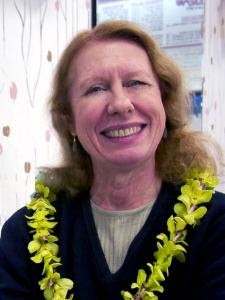By Staff Reports
(Oahu)– Meda Chesney-Lind, professor and chair of the Women’s Studies Department in the College of Social Sciences at UH Mānoa, has been named president-elect of the American Society of Criminology (ASC). The ASC is an international organization representing nearly 4,000 members from 63 countries. The major professional organization for criminologists in the United States, ASC members focus on the pursuit of scholarly, scientific and professional knowledge concerning the analysis, prevention, control and treatment of crime and delinquency.
Chesney-Lind will serve as the 81st president of the ASC. She will work to further expand public awareness of the ASC as a significant resource for policymakers seeking new perspectives on crime and justice policy issues faced by communities.
Said Chedsney-Lind, “I believe the ASC can play a central role in shaping not only the future direction of research on crime, but also criminal justice policy, both in the U.S. and beyond. I have long been an advocate for involvement of criminologists in policy formation. Given the heightened national and global concern about crime and crime trends, our voice, grounded in the best research, is all the more necessary as these issues are discussed and debated publically.”
Chesney-Lind received her bachelor’s degree in sociology from Whitman College, and her master’s and doctoral degrees in sociology from UH Mānoa. Her current research focuses on crime and justice, female delinquency, youth gangs, and programs for youths at risk.
A former vice president of the American Society of Criminology and former president of the Western Society of Criminology, she is nationally recognized for her work on women and crime. Her books include Girls, Delinquency and Juvenile Justice, which was awarded the American Society of Criminology’s Michael J. Hindelang Award for outstanding contribution to criminology; and The Female Offender: Girls, Women and Crime, published by Sage.
Nationally recognized for her work on women and crime, her testimony before Congress resulted in national support of gender responsive programming for girls in the juvenile justice system. Her book on girls’ use of violence, Fighting for Girls (co-edited with Nikki Jones), won an award from the National Council on Crime and Delinquency for “focusing America’s attention on the complex problems of the criminal and juvenile justice systems.” In 2013, the Western Society of Criminology named an award honoring “significant contributions to the field of gender, crime, and justice” for Chesney-Lind and gave her the inaugural award.
Chesney-Lind is an outspoken advocate for girls and women, particularly those who find their way into the criminal justice system. Her work on the problem of sexism in the treatment of girls in the juvenile justice system was partially responsible for the recent national attention devoted to services to girls in that system. More recently, she has worked hard to call attention to the soaring rate of women’s imprisonment and the need to vigorously seek alternatives to women’s incarceration.
Like Us

